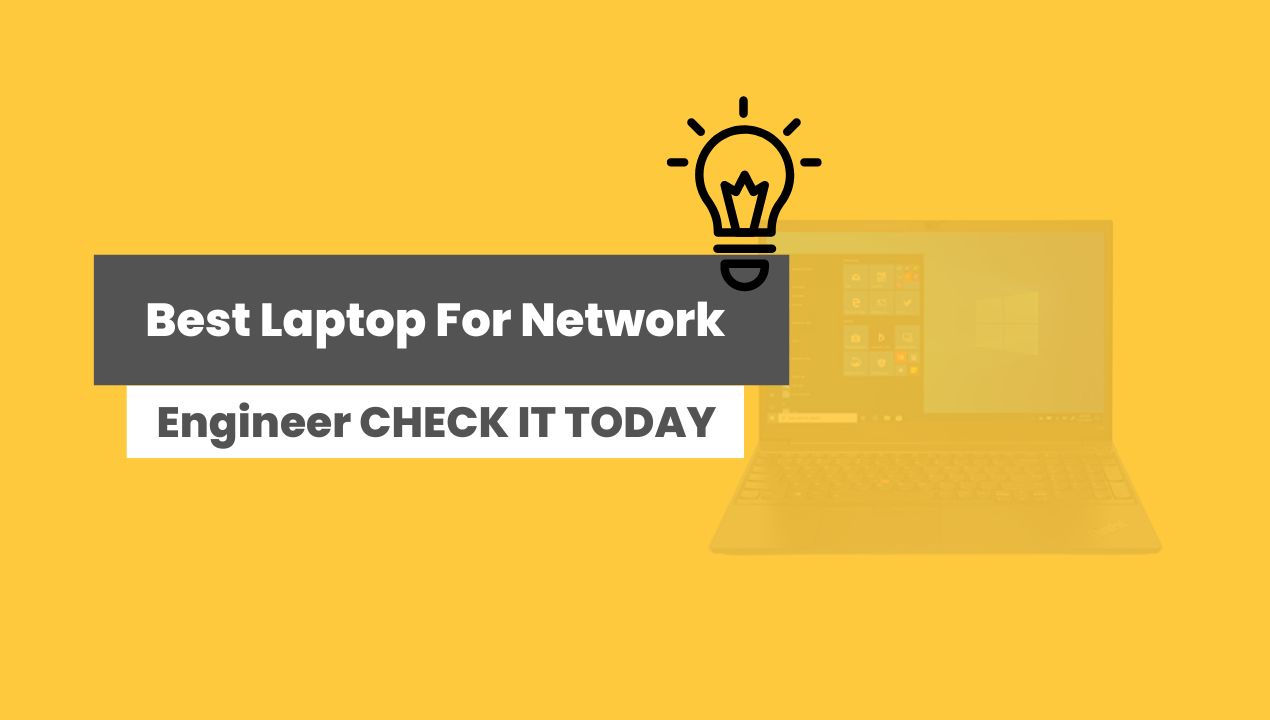As a network engineer, you need a laptop that is powerful enough to handle complex networking tasks, has a large storage capacity for all of your important files, and is portable so that you can take it with you wherever you go.
A network engineer is responsible for the design, implementation, and maintenance of an organization’s computer networks. They work with other engineers and technicians to ensure that the network is able to handle the ever-increasing demands of modern businesses.
Network engineers must have a strong understanding of computer hardware and software, as well as networking protocols and standards.
They must be able to troubleshoot problems and have excellent problem-solving skills.
Excellent communication and interpersonal skills are also essential, as they will often be working with other teams in order to resolve issues.
Network engineering is a challenging and rewarding career choice. Those who enter this field can expect to find plenty of job opportunities, as there is a high demand for qualified professionals. With the right education and training, anyone can become a successful network engineer.
If you are in the market for a new laptop and are a network engineer, you may be wondering what the best laptops for network engineers are. In this article, we will take a look at some of the best laptops for network engineers and what features make them ideal for this profession.
What To Look For In A Laptop For Network Engineering:
When it comes to finding the best laptops for network engineering, there are a few key things to keep in mind. You’ll want a machine that is powerful enough to handle the demands of your job.
That means looking for a processor with good speed and plenty of RAM. Next, you’ll want to make sure that the laptop has plenty of storage space.
Network engineering can involve working with large files, so you’ll need a machine with a sizable hard drive or SSD. You will also need a good graphics card. Many network engineering tasks involve visualizing data or working with diagrams, so a good graphics card will make your life much easier.
Finally, consider the portability of the laptop. If you’re often on the go, you’ll want something that’s lightweight and easy to transport. But if you mostly work from a single location, portability may not be as much of a concern as you think.
Minimum Requirements:
Processor: Minimum Intel Core i5 or better is recommended.
Storage: Minimum 256GB SSD
RAM: 8GB of DDR4 RAM (minimum)
Graphic Card: NVIDIA GeForce GTX 1050 Ti or better
Display: An FHD (Full HD Display) is required.
A List of Some of the Best Laptop For Network Engineers:
1. Microsoft Surface Pro 7
2. Apple MacBook Pro.
3. Lenovo ThinkPad E15
4. Acer Predator Helios 300
5. MSI GS65
6. HP 13.3″ Spectre x360 2-in 1
1. Microsoft Surface Pro 7
If you’re looking for the best laptop for network engineers, the Microsoft Surface Pro 7 is a great choice. It’s lightweight and portable, making it easy to take with you on the go. Plus, its powerful processor and large screen make it perfect for working on complex projects.
And with its long battery life, you can stay productive all day long. When it comes to finding the best laptops for network engineers, the Microsoft Surface Pro 7 is a top choice.
This versatile 2-in-1 laptop can handle all of the demands of network engineering, from design and planning to implementation and troubleshooting.
With its powerful Intel Core i5 a 10th generation processor and 8GB of RAM, the Surface Pro 7 can easily handle even the most complex networking tasks. And its 12.3-inch touchscreen display is perfect for viewing diagrams and other detailed information.
The Surface Pro 7 also includes a full version of Windows 10, so you can use all your favorite networking software. Plus, its built-in security features provide an extra layer of protection for your critical data.
If you’re looking for a versatile and powerful laptop that can handle all your networking needs, the Microsoft Surface Pro 7 is an excellent choice.
Key Specifications:
Processor: 10th Gen Intel Quad-Core i5-1035G4
Display: 12.3″ 2736 x 1824 PixelSense Touchscreen
RAM: 8GB RAM
Storage: 128GB PCIe SSD Storage
Connectivity: Bluetooth 5.0, 802.11n WIFI 6
Operating System: Windows 10 Pro
Battery Life: Up to 10.5 Hours of Battery Life
2.Apple MacBook Pro
The Apple MacBook Pro is the best laptop for network engineers. It has a powerful processor and plenty of storage space. Plus, the MacBook Pro’s Retina display is perfect for viewing diagrams and other network information.
If you’re looking for a laptop that can handle all your networking needs, the Apple MacBook Pro is the way to go. It’s got a fast processor and plenty of storage space, so you can keep all your important files and applications close at hand.
Plus, the Retina display is perfect for viewing diagrams and other network information. So whether you’re just starting out in your career or you’re a seasoned pro, the MacBook Pro is the ideal choice for anyone who needs a top-of-the-line laptop for their networking needs.
Key Specifications:
Processor: Apple M2 chip
Display: 13.3-inch Retina Display with IPS Technology
RAM: 8GB RAM
Storage: 256GB SSD Storage
Connectivity: Bluetooth, Wi-Fi 802.11ax Wi-Fi 6
Operating System: Mac OS
Battery Life: Up to 20 Hours of Battery Life
3.Lenovo ThinkPad E15
A laptop is an essential tool for any network engineer. It needs to be able to handle all the software and hardware that a network engineer might need to use. The Lenovo ThinkPad is the best laptop for a network engineer.
It has all the necessary ports, a powerful processor, and a large screen. The ThinkPad also has a durable design that can withstand the rigors of travel. It has an Intel Core i7 processor, 32 GB RAM, and a 1 TB SSD.
The laptop also has a 15.6-inch FHD IPS display and weighs just 4.2 pounds. The ThinkPad E15 also has great battery life, lasting over 9 hours on a single charge.
It’s perfect for network engineers who need to be constantly mobile and don’t have time to stop and recharge their laptops every few hours. If you’re looking for the best laptop for network engineers, the Lenovo ThinkPad E15 is a clear choice.
Key Specifications:
Processor: 11th Gen Intel Core i7-1165G7
Display: 15.6″ FHD IPS Display
RAM: 32GB DDR4 RAM
Storage: 1TB M.2 NVMe SSD
Connectivity: Wi-Fi 6 AX201 802.11AX (2 x 2) and Bluetooth 5.2
Operating System: Windows 11 Pro
Battery Life: Up To 9 Hours of Battery Life
4. Acer Predator Helios 300
Acer Predator Helios 300 is one of the best laptops for network engineers. It is very powerful and has a lot of features that make it perfect for this job. The display is large and clear, making it easy to see what you are doing.
The keyboard is also very comfortable to use, making it easy to type for long periods of time. The touchpad is also very responsive, making it easy to navigate around the screen.
Overall, this laptop is a great choice for anyone who needs a powerful laptop that can handle all of their networking needs.It has a large 15.6-inch display, making it perfect for working with multiple windows and applications open at the same time.
The Predator Helios 300 is also one of the fastest laptops on the market, thanks to its Intel Core i7 processor and NVIDIA GeForce GTX 1660 graphics card. Plus, with a battery life of up to 7 hours, you can stay productive even when you’re on the go.
Key Specifications:
Processor: 9th Generation Intel Core i7 9750H 6 Core Processor
Display: 15.6 inches Full HD (1920 x 1080) Widescreen IPS Display
RAM: 16GB RAM
Storage: 256GB SSD
Connectivity: Bluetooth 5.0, 802.11ac WIFI 6
Operating System: Windows 10 Home
Battery Life: Up to 7 Hours of Battery Life
5. MSI GS65
MSI GS65 is the best laptop for network engineers. It is packed with features that are essential for any network engineer. The processor is fast and powerful, making it perfect for running multiple virtual machines
. The built-in security features keep your data safe and secure. And the large screen size makes it easy to see everything you need while working on your designs.MSI GS65 has the latest Intel Core i7 processor and it is very fast.
It also has 8GB of RAM which is enough for most tasks. The storage space is also huge with 512 SSD. The display of the laptop is also very good with Full HD resolution.
The battery life of MSI GS65 is also very good and it can last for more than 6 hours on a single charge. If you’re looking for a laptop that can handle all of your networking needs, then the MSI GS65 is definitely the best choice for network engineers.
Key Specifications:
Processor: Core i7-9750H Processor
Display: 15. 6″ FHD, IPS Thin Bezel Display
RAM: 8GB RAM
Storage: 512GB SSD
Connectivity: Bluetooth 5, 802. 11 ac WIFI 6
Operating System: Windows 10 Home
Battery Life: More than 6 Hours of Battery Life
6. HP 13.3″ Spectre x360 2-in 1
There are a lot of different laptops on the market and it can be hard to decide which one is the best for you. If you’re a network engineer, you need a laptop that is powerful enough to handle all of your tasks.
The HP 13.3 Spectre x360 2-in-1 is the best laptop for network engineers. It has an Intel Core i7 processor and 8 GB of RAM, making it perfect for running multiple network applications simultaneously.
Plus, the HP Spectre x360 is a 2-in-1 laptop, so you can use it as a traditional laptop or convert it into a tablet when you need to be more mobile.
And finally, the HP 13.3 Spectre x360 2-in-1 is extremely durable, meaning it can withstand being dropped or knocked around in a busy office environment. If you’re looking for the best laptop for a network engineer, the HP 13.3 Spectre x360 2-in-1 is a great option.
It’s lightweight and portable, yet still has a large screen size that’s perfect for working on complex networking projects. Plus, the built-in fingerprint reader adds an extra layer of security to your work.
Key Specifications:
Processor: Core i7-8565U processor
Display: 13.3″ Full HD Touchscreen
RAM: 8GB DDR4 RAM
Storage: 256GB SSD Storage
Connectivity: Bluetooth 5, 802.11b WIFI
Operating System: Windows 10 Home
Battery Life: Up To 7 Hours of Battery Life
Why High-Performance Laptop Required for Network engineering?
Network engineering is a field that requires robust and efficient computing devices to handle the demanding tasks involved in managing and optimizing networks.
In this article, we will explore why a high-performance laptop is essential for network engineering professionals and how it can enhance productivity, troubleshooting capabilities, and overall efficiency.
- Handling Complex Network Configurations: Network engineers often deal with complex network configurations and need powerful laptops to handle the processing requirements. High-performance laptops equipped with fast processors, ample RAM, and dedicated graphics cards can effortlessly handle tasks such as configuring routers, switches, and firewalls. These laptops provide the necessary computational power to handle large-scale network designs and configurations without experiencing lag or slowdowns.
- Simulating Network Environments: Simulating network environments is a crucial aspect of network engineering, especially during the testing and troubleshooting phases. High-performance laptops can run network simulation software smoothly, allowing engineers to emulate and analyze various network scenarios. The ability to accurately simulate network environments helps identify potential bottlenecks, optimize network performance, and ensure seamless operations.
- Managing Network Monitoring and Analysis Tools: Network engineers rely heavily on network monitoring and analysis tools to identify and resolve issues proactively. These tools collect vast amounts of network data and require significant processing power to analyze and interpret the data effectively. With a high-performance laptop, engineers can run multiple monitoring tools simultaneously, process real-time data, and generate detailed reports, empowering them to diagnose and troubleshoot network problems efficiently.
- Virtualization and Cloud Computing: Network engineers often work with virtualization technologies and cloud platforms to deploy, manage, and maintain network infrastructure. High-performance laptops with virtualization support enable engineers to run multiple virtual machines concurrently, providing them with a flexible testing environment and the ability to experiment with different network configurations. Additionally, a robust laptop ensures smooth connectivity to cloud services, allowing engineers to manage and monitor network resources seamlessly.
- Enhanced Mobility and Fieldwork: Network engineering often involves on-site visits, fieldwork, and troubleshooting in different locations. High-performance laptops are designed to be portable, lightweight, and durable, making them ideal for network engineers who frequently work outside the office. These laptops offer reliable connectivity options, such as fast Wi-Fi and Ethernet ports, ensuring engineers can connect to network devices and diagnose issues effectively, even in remote locations.
Buying Guide: Best Laptop For Network Engineers
Are you a network engineer looking for the perfect laptop to support your work? Look no further! We have compiled a buying guide to help you make an informed decision. When selecting a laptop for network engineering tasks, there are several key factors to consider.
First and foremost, prioritize processing power. Opt for a laptop with a high-performance processor, such as an Intel Core i7 or AMD Ryzen 7. This will ensure smooth multitasking and quick execution of network-related tasks.
Next, consider the RAM capacity. Network engineers often work with resource-intensive applications, so aim for at least 16GB of RAM to ensure seamless performance.
Storage is another crucial aspect. Look for a laptop with a solid-state drive (SSD) rather than a traditional hard drive. SSDs offer faster data access, enabling quicker software installations and file transfers.
In terms of connectivity, ensure the laptop has an Ethernet port for direct network connections. Additionally, multiple USB ports, including USB-C, will be useful for connecting various networking devices.
Display size and resolution are subjective, but a 15-inch laptop with a Full HD (1920×1080) or higher resolution will provide a good balance between portability and visual clarity.
Battery life is essential for on-the-go network troubleshooting. Aim for a laptop with a long-lasting battery or one that offers a quick-charging feature to minimize downtime.
Lastly, consider the overall build quality and portability of the laptop. Look for a lightweight and durable design that can withstand the demands of daily use.
Based on these criteria, some popular choices for network engineers include the Dell XPS 15, Lenovo ThinkPad X1 Carbon, and HP Spectre x360. However, always compare specifications, read reviews, and consider your specific requirements before making a purchase.
Remember, investing in a reliable and powerful laptop will enhance your productivity as a network engineer. Happy shopping!
FAQs:
Q: What are the key factors to consider when choosing a laptop for networking students?
A: When selecting a laptop for networking studies, you should consider factors like performance, portability, connectivity options, battery life, and the ability to run networking software smoothly.
Q: What is the recommended minimum configuration for a laptop for networking students?
A: Ideally, a laptop for networking students should have a minimum of an Intel Core i5 or AMD Ryzen 5 processor, 8GB of RAM, and a solid-state drive (SSD) with at least 256GB of storage. This configuration ensures smooth multitasking, faster data access, and ample storage for networking-related files and applications.
Q: Which operating system is best for networking students?
A: Networking students often work with a variety of tools and software that are compatible with multiple operating systems. However, Windows and macOS are the most commonly used operating systems in networking. It’s essential to consider your personal preferences and the compatibility of the networking software you’ll be using when choosing an operating system.
Q: Are there any specific connectivity features to look for in a laptop for networking students?
A: Yes, networking students should consider laptops with good Wi-Fi capabilities, preferably supporting the latest Wi-Fi standards (such as Wi-Fi 6 or Wi-Fi 6E) for faster and more reliable wireless connections. Additionally, having an Ethernet port and support for Bluetooth can be advantageous for networking-related tasks.
Q: Is a dedicated graphics card necessary for networking with students?
A: While a dedicated graphics card is not a strict requirement for networking studies, it can be beneficial for certain tasks, such as running network simulation software or handling graphical representations of network topologies. However, most networking tasks are more CPU and memory-intensive, so prioritize a good processor and sufficient RAM over a dedicated graphics card.
Q: Can you recommend any specific laptop models for networking students?
A: Certainly! Some popular laptop models that are suitable for networking students include the Dell XPS 13, Lenovo ThinkPad X1 Carbon, HP Spectre x360, MacBook Pro (M1 chip), Asus ROG Zephyrus G14, and Acer Swift 3. These laptops offer a balance of performance, portability, and connectivity options.
Remember, the best laptop choice ultimately depends on your specific requirements and budget. It’s always a good idea to research and read reviews before making a final decision.
Conclusion:
In conclusion, the above laptops can be regarded as the best laptops for Network engineers however if you go for Acer Predator Helios 300 or Apple MacBook Pro you would definitely get a competitive edge over your colleagues.
MacBook Pro is lightweight, has a long battery life, and is powerful enough to handle any networking tasks. Additionally, the MacBook Pro has a retina display that is perfect for viewing diagrams and other network information.


